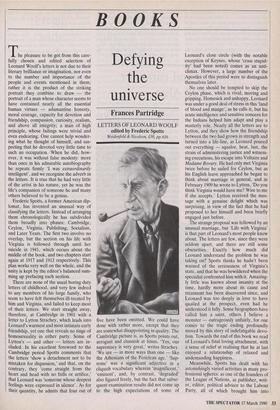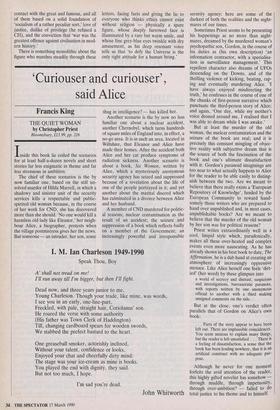BOOKS
Defying the universe
Frances Partridge
LETTERS OF LEONARD WOOLF edited by Frederic Spotts Weidenfeld & Nicolson, £30, pp.616 The pleasure to be got from this care- fully chosen and edited selection of Leonard Woolf's letters is not due to their literary brilliance or imagination, nor even to the number and importance of the people and events mentioned in them; rather it is the product of the striking portrait they combine to draw — the portrait of a man whose character seems to have contained nearly all the essential human virtues — adamantine honesty, moral courage, capacity for devotion and friendship, compassion, curiosity, realism, and above all integrity; a man of high principle, whose failings were trivial and even endearing. One cannot help wonder- ing what he thought of himself, and sus- pecting that he devoted very little time to such an occupation. When he did, how- ever, it was without false modesty: more than once in his admirable autobiography he repeats firmly 'I was extraordinarily intelligent', and we recognise the adverb in the letters. It is true that he had very little of the artist in his nature, yet he was the life's companion of someone he and many others believed to be a genius.
Frederic Spotts, a former American dip- lomat, has invented an unusual way of classifying the letters. Instead of arranging them chronologically he has subdivided them broadly into phases: Cambridge, Ceylon, Virginia, Publishing, Socialism, and Later Years. The first two involve no overlap, but the section on his life with Virginia is followed through until her suicide in 1941, which occurs about the middle of the book, and two chapters start again at 1917 and 1913 respectively. This plan works very well on the whole, and the unity is kept by the editor's balanced sum- ming up prefacing each section.
There are none of the usual boring duty letters of childhood, and very few indeed to any members of his large family, who seem to have felt themselves ill-treated by him and Virginia, and failed to keep most of their letters. We start straight away, therefore, at Cambridge in 1901 with a letter to Lytton Strachey, which leads into Leonard's warmest and most intimate early friendship, yet one that reveals no tinge of homosexuality in either party. Some of Lytton's — and other — letters are in- cluded. In his excellent foreword to the Cambridge period Spotts comments that the letters 'show a detachment not to be mistaken for dispassion,' and that, on the contrary, they 'come straight from the heart and head with no frills or artifice,' that Leonard was 'someone whose deepest feelings were expressed in silence'. As for their quantity, he admits that four out of five have been omitted. We could have done with rather more, except that they are somewhat disappointing in quality. The Cambridge picture is, as Spotts points out, arrogant and clannish at times. 'Yes, our supremacy is very great,' writes Strachey. `We are — in more ways than one — like the Athenians of the Periclean age.' Sup- reme' was a significant adjective in a cliquish vocabulary wherein 'magnificent,' `eminent', and, by contrast, 'degraded' also figured freely, but the fact that subse- quent examination results did not come up to the high expectations of some of Leonard's close circle (with the notable exception of Keynes, whose 'crass stupid- ity' had been noted) comes as an anti- climax. However, a large number of the Apostles of this period were to distinguish themselves later.
No one should be tempted to skip the Ceylon phase, which is vivid, moving and gripping. Homesick and unhappy, Leonard was under a good deal of stress in this 'land of blood and mange', as he calls it, but his acute intelligence and sensitive concern for the Indians helped him adapt and play a masterly role. Nearly all the letters are to Lytton, and they show how the friendship between the two had grown in strength and turned into a life-line, as Leonard poured out everything — squalor, heat, lust, the strain of administering justice and witness- ing executions, his escape into Voltaire and Madame Bovary. He had only met Virginia twice before he sailed for Ceylon, but as his English leave approached he began to think about marriage in general, and in February 1909 he wrote to Lytton, 'Do you think Virginia would have me? Wire to me if she accepts.' Lytton received the mes- sage with a genuine delight which was surprising, in view of the fact that he had proposed to her himself and been briefly engaged just before.
The strange proposal was followed by an unusual marriage, but 'Life with Virginia' is that part of Leonard's most people know about. The letters are few, since they were seldom apart, and there are still some obscurities. Exactly how much did Leonard understand the problem he was taking on? Spotts thinks he hadn't been warned of the seriousness of Virginia's state, and that he was bewildered when the specialist confronted him with it. Amazing- ly little was known about insanity at the time, hardly more about its cause and treatment has been discovered since, and Leonard was too deeply in love to have quailed at the prospect, even had he understood it fully. Some biographers have called him a saint, others I believe a monster — outrageously unfairly, for one comes to the tragic ending profoundly moved by this story of indefatigable devo- tion. Towards the end of this book we read of Leonard's final loving attachment, with a sense of relief at realising that he at last enjoyed a relationship of relaxed and undemanding happiness.
Meanwhile, Spotts has dealt with his astonishingly varied activities in many pro- fessional spjieres: as one of the founders of the League of Nations, as publisher, writ- er, editor, political advisor to the Labour Party, all of which brought him into contact with the great and famous, and all of them based on a solid foundation of `socialism of a rather peculiar sort,' love of justice, dislike of privilege (he refused a CH), and the conviction that 'war was the greatest offence against civilisation in mod- ern history.'
There is something monolithic about the figure who marches steadily through these letters, facing facts and giving the lie to everyone who thinks ethics cannot exist without religion — physically a spare figure, whose deeply furrowed face is illuminated by a rare but warm smile, and whose fine grey-blue eyes twinkle with dry amusement, as his deep resonant voice tells us that 'to defy the Universe is the only right attitude for a human being.'



























































 Previous page
Previous page